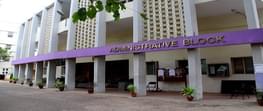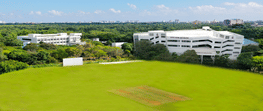Dr. Fatima Vasanth is the Academic Director of Patrician College of Arts and Science in Chennai. She holds a BA degree in English literature from Auxilium College, Tamil Nadu; an MSW degree from Stella Maris College, Chennai, an M.Phil., and a Ph.D. degree from Madras School of Social Work. She has almost 40 years of experience in the fields of teaching and research. She has held prestigious positions in the academic arena throughout her career. Additionally, she was also a visiting faculty member Universities in USA, Sri Lanka and other SAARC countries.
Dr. Fatima Vasanth was the research guide for 32 scholars and also served as external and viva examiner at Madras University, Mizoram, Trivandrum, Bharathiyar, and Bharathidasan University. She received the “Lifetime Achiever Award” from the Indian Society of Professional Social Work and Pondicherry University on February 22, 2018, and the “Best Educationist Award” from the Government of Tamil Nadu in 2011. Furthermore, she has published several national and international papers throughout her career.

To apply a practical approach to the subjects and make them more related to the industry, how do you attempt to do so?
At Patrician College of Arts and Science, everything from tutorials and lectures to topics and semesters integrates an applied perspective and features elements supported by industry professionals. Our hands-on learning incorporates project work, internships, and factory visits to ensure that the student touches theories with practice. Guest lectures, workshops, and seminars are incorporated into the curriculum to ensure students are up-to-date with trends in the market. Technical and soft courses and skill development programs help improve the employability of the students. Our activities in research are directed at the identified problems of the industry and to support innovations. The offer of career guidance, as well as career placements, also helps our graduates be prepared for gainful employment in their desired areas of specialization.
How do you plan or map the curriculum, and how frequently does it get revised to make it appropriate for the students?
Seats for the course are open, and we are under the University of Madras institution, which implies that we follow the university’s curriculum. But by doing so, we guarantee that all of them are effective for students. This process has to be done in cooperation with professionals from the industry and academic scholars to introduce current trends and potential technologies. This course is therefore more balanced with theoretical content as well as the applications of those theories as found in the real world. In this learning institution, curriculum updates are done on an annual basis, mainly depending on feedback from the faculty, students, and various stakeholders in industries. The intended learning-training outcome is to enhance students’ competence to enable them to compete successfully in the global job market upon completion of their programs.
What can be seen as the best practice offered by the departments to the students?
Departments provide recommendations like using case works, project works, and internships as a part of practicing final works. We offer the relevant state-of-the-art laboratories and workshops for training and development. Industry professional's guest speakers and career guidance sessions add to the professional touch. This is true as our curriculum focuses on ensuring that the students obtain values and skills in teamwork, critical thinking, and problem-solving. Such practices help to ensure the students attain the behavioral abilities and knowledge required for productive employment.
What is the new program that you have introduced at your institute recently?
Thus, concerning the fast-growing technology & advancement, we endeavor to skill ourselves and respond to the increasing market demands. The academic year has witnessed the addition of specializations such as data science and artificial intelligence, which are quite popular. Entrepreneurship Mela and capacity-building programs are both being organized to improve entrepreneurial skills, and there are separate activities for the improvement of communication and personality skills.
The most recent one is for Commerce students and highlights Financial Technology (FinTech), which combines finance with modern technology to train the students for operative posts in digital banking and assessment of financial scenarios.
The institute also targets computer science learners and upon completing the course, learners will further specialize in artificial intelligence and machine learning, which prepares them to analyze data, automate, and innovate in AI.
Psychology students are offered an industrial/organizational psychology concentration at the institute, customer/employee behavior, OD, and leadership development; this way, students are in a better position to deal with modern organizational dynamics.
For BBA students, it comprises a specialized program in business analytics and strategic management. Out of all these programs, this one enhances the analytical skills, strategic thinking, and business know-how of the students. It equips them to perform in fast-growing businesses and industries by utilizing state-of-the-art approaches to capturing and analyzing business information and then outlining innovative business strategies, hence standing out from the competition in the business world.
For social work students, it provides a specialized program in community development and social innovation. They can develop realistic knowledge of community involvement, health program management, and social enterprise, thereby empowering them to solve societal problems and foster change in various sectors of society.
Check Patrician College of Arts and Science Courses & Fees
In what ways does the program assure that the students it produces are geared to meet future competencies?
Every program taught in college makes a student ready for the future by adopting new beliefs and technologies. Great emphasis is placed on their practical applicability with the help of interaction with industries, internships, and projects. Career mentoring and professional training allow for increased employability and preparedness for new and progressive kinds of work. The curriculum is dynamic; through feedback from industry, the courses meet the current and future dynamic market, ensuring students graduate to meet the market challenges.
What are the perks and course paths that a person is bound to have after going through this course?
The students gain from the pursuit of programs, improved employment chances due to practical skills and market relevance. Occupational fields include fields of finance, information technology, social services, and business administration, to name a few; employment opportunities in these fields include financial analysts, computer programmers, and statisticians, among others; social services and welfare; and organizational development, among other important positions.
What was your vision when you came to college, and how are you attempting to achieve that same vision?
My vision is to transform the atmosphere into one of learning, exposure, and improving the standards of the institution to compete in the international market by improving the standards of academic and organizational activities and finding people with similar ideas. I am trying to achieve this by sensitizing important performers, participating in research exercises, training each department, and boosting internships as a way of exposure. Getting more and more involved in industry connects through MOUs at the national and international levels.
What are the major assets of the college, and how can they be developed further?
The college’s biggest asset is probably the faculty, which consists of diversely educated and experienced people, effective academic programs, and an active campus life. This strength could be further improved by more inter-professional collaboration, more student involvement, more encouraging education-oriented undertakings, and more research and career-related provisions.
Can you give some valuable advice that a student might need, rather than wish him or her a prosperous future career?
My general advice for students is, firstly, the desire to continuously learn new things; secondly, participation in internships and meetings with representatives of the desired field; and thirdly, the cultivation of determination in communication and creative approaches to problem-solving. To sum up, enriching the educational programs with extra curriculum and a healthy orientation toward further work will open the way to an effective and successful career.


.png?h=132&w=263&mode=stretch)
.png?h=132&w=263&mode=stretch)




.png?h=78&w=78&mode=stretch)
.png?h=78&w=78&mode=stretch)



![Madras Christian College - [MCC]](https://image-static.collegedunia.com/public/college_data/images/appImage/2708_MCC.jpg?h=111.44&w=263&mode=stretch)

![Women's Christian College - [WCC]](https://image-static.collegedunia.com/public/college_data/images/appImage/5425_WCCOL_APP.jpg?h=111.44&w=263&mode=stretch)













.jpeg?h=90.56&w=161&mode=stretch)
.jpeg?h=90.56&w=161&mode=stretch)



.png?h=72&w=72&mode=stretch)
.png?h=72&w=72&mode=stretch)


![Kumararani Meena Muthiah College of Arts and Science - [KRMMCAS]](https://image-static.collegedunia.com/public/college_data/images/logos/1674115365image22.png?h=72&w=72&mode=stretch)









![C Kandasami Naidu College for Men - [CKNC]](https://image-static.collegedunia.com/public/college_data/images/logos/1415364335laaaan.png?h=72&w=72&mode=stretch)

![Women's Christian College - [WCC]](https://image-static.collegedunia.com/public/college_data/images/logos/145554053510247414_583497168413625_5026693845396837683_n-150x150.jpg?h=72&w=72&mode=stretch)
![Madras Christian College - [MCC]](https://image-static.collegedunia.com/public/college_data/images/logos/1393668198Madras Christian College.png?h=72&w=72&mode=stretch)



Comments